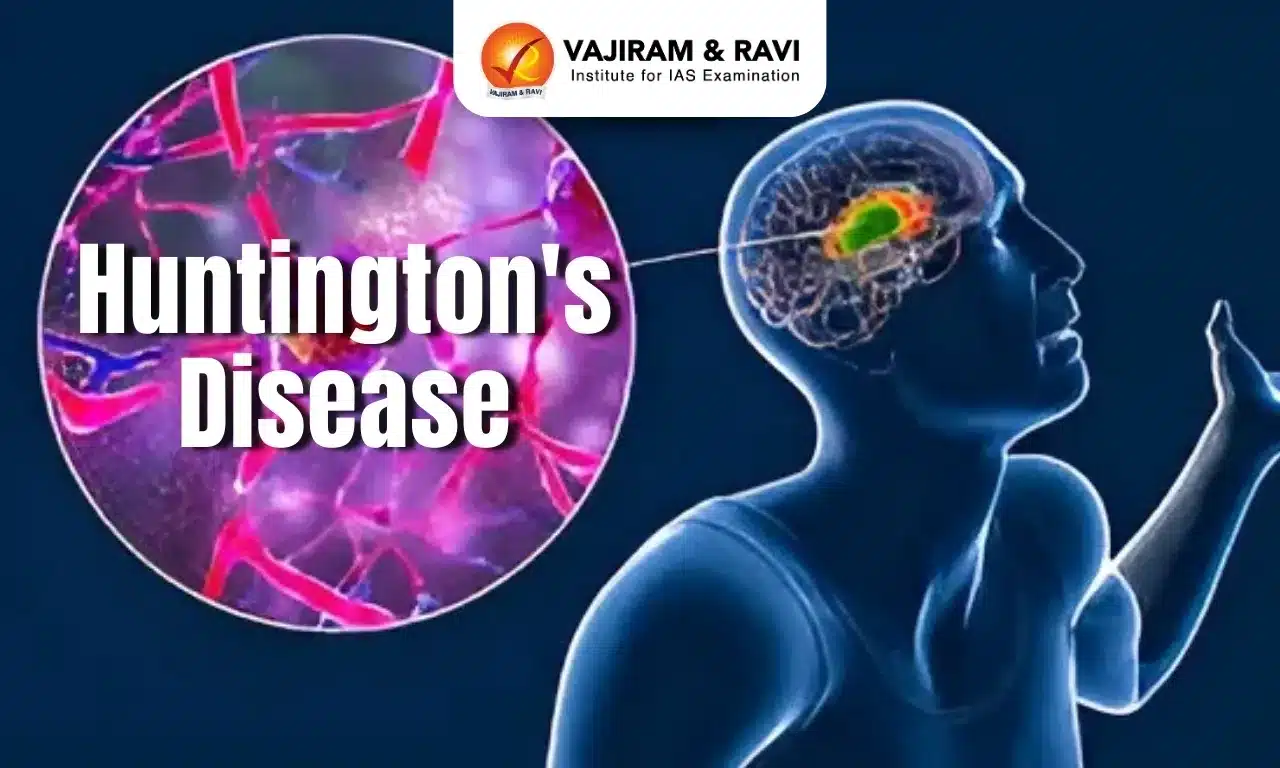Huntington’s Disease Latest News
The union and state governments have yet to include Huntington’s disease in the rare category under the National Policy for Rare Diseases, a demand raised by patients and caregivers in 2024.
About Huntington’s Disease
- It is a genetic condition that affects the cells in your brain.
- It is an inherited condition that causes brain cells to slowly lose function and die.
- If one of your parents has HD, you have a 50% chance of also developing it.
- It affects the cells in parts of your brain that regulate voluntary movement and memory.
- What causes Huntington’s disease?
- A genetic mutation of the HTT gene causes Huntington’s disease.
- The HTT gene makes a protein called huntingtin. This protein helps your nerve cells (neurons) function.
- If you have HD, your DNA doesn’t have all the information needed to make the huntingtin protein.
- As a result, these proteins grow in an abnormal shape and destroy (instead of help) your neurons.
- Your neurons die because of this genetic mutation.
- The destruction of nerve cells happens in the basal ganglia, or the region of your brain that regulates your body’s movements.
- It also affects the brain cortex (surface of your brain) that regulates your thinking, decision-making, and memory.
- How common is HD?
- Huntington’s disease affects an estimated 3 to 7 out of every 100,000 people, most often people of European ancestry (biological family comes from European descent).
- Symptoms:
- Common symptoms include uncontrollable dance-like movements (chorea) and abnormal body postures, as well as problems with behavior, emotion, thinking, and personality.
- Other symptoms may include tremor (unintentional back-and-forth movement in the person’s muscles) and unusual eye movements. The eye movements can happen early in the disease.
- These symptoms get worse over time.
- As HD progresses, you will need constant assistance and supervision because of the debilitating nature of the disease.
- People usually die from the disease within 15 to 20 years of developing symptoms.
- Treatment:
- There is no treatment that can stop or reverse HD, but health care providers can offer medications to help with certain symptoms.
Source: DH
Last updated on December, 2025
→ Check out the latest UPSC Syllabus 2026 here.
→ Join Vajiram & Ravi’s Interview Guidance Programme for expert help to crack your final UPSC stage.
→ UPSC Mains Result 2025 is now out.
→ UPSC Notification 2026 is scheduled to be released on January 14, 2026.
→ UPSC Calendar 2026 is released on 15th May, 2025.
→ The UPSC Vacancy 2025 were released 1129, out of which 979 were for UPSC CSE and remaining 150 are for UPSC IFoS.
→ UPSC Prelims 2026 will be conducted on 24th May, 2026 & UPSC Mains 2026 will be conducted on 21st August 2026.
→ The UPSC Selection Process is of 3 stages-Prelims, Mains and Interview.
→ UPSC Result 2024 is released with latest UPSC Marksheet 2024. Check Now!
→ UPSC Prelims Result 2025 is out now for the CSE held on 25 May 2025.
→ UPSC Toppers List 2024 is released now. Shakti Dubey is UPSC AIR 1 2024 Topper.
→ UPSC Prelims Question Paper 2025 and Unofficial Prelims Answer Key 2025 are available now.
→ UPSC Mains Question Paper 2025 is out for Essay, GS 1, 2, 3 & GS 4.
→ UPSC Mains Indian Language Question Paper 2025 is now out.
→ UPSC Mains Optional Question Paper 2025 is now out.
→ Also check Best IAS Coaching in Delhi
Huntington's Disease FAQs
Q1. What is Huntington's Disease?+
Q2. Which part of the brain is most affected in Huntington’s disease?+
Tags: huntington’s disease

















